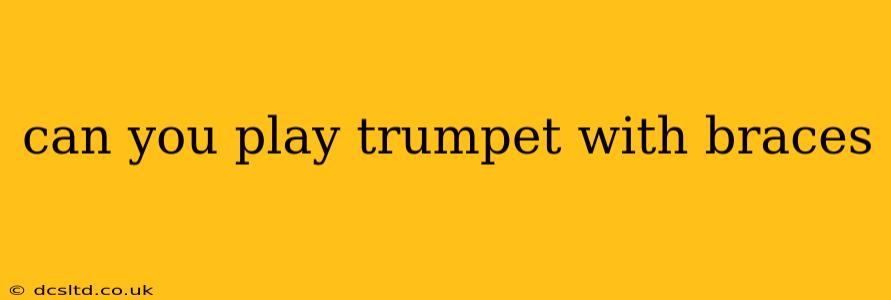Can You Play Trumpet With Braces?
The short answer is: yes, you can generally play trumpet with braces, but it might require some adjustments and careful consideration. Many trumpet players successfully navigate playing their instrument while wearing braces. However, it's not always a seamless transition, and understanding the potential challenges and solutions is key.
What are the potential problems?
This is a common question among young musicians, and it's important to address the potential difficulties. The main concern revolves around the buccal tubes (the metal parts that stick out from the back of your braces). These can interfere with the mouthpiece and embouchure (the way you position your mouth on the mouthpiece).
- Mouthpiece discomfort: The buccal tubes can create pressure points and discomfort against the mouthpiece. This can make it difficult to achieve a comfortable and efficient embouchure, impacting tone quality and playing technique.
- Limited embouchure flexibility: Braces can restrict the natural movement of your lips and mouth, affecting your ability to produce certain notes and achieve optimal embouchure flexibility. This can be especially challenging for advanced techniques like high notes and rapid tonguing.
- Increased saliva production: Some players find that braces increase saliva production, which can affect playing comfort and potentially impact the instrument's hygiene.
How can you mitigate these problems?
Fortunately, several strategies can help alleviate the challenges of playing trumpet with braces:
- Talk to your orthodontist: Discuss your musical aspirations with your orthodontist before getting braces. They might be able to offer suggestions regarding brace placement or types of braces that minimize interference with playing. In some cases, a slight adjustment to the brace placement could make a significant difference.
- Experiment with mouthpieces: Different mouthpiece sizes and shapes can affect how the mouthpiece interacts with your braces. Experimenting with various mouthpieces to find one that provides a comfortable fit is crucial. Consult with a music teacher or experienced trumpeter for advice on suitable mouthpiece choices.
- Adjust your embouchure: You might need to slightly adjust your embouchure technique to accommodate the braces. A qualified trumpet instructor can provide guidance on adapting your technique for optimal comfort and performance.
- Practice regularly: Consistent practice is essential to maintain your skills and adapt to the changes in embouchure. Regular practice will build muscle memory and help you compensate for any limitations imposed by the braces.
- Maintain good oral hygiene: This is crucial whether or not you play an instrument. Braces require diligent cleaning to prevent plaque buildup, and this is even more critical when playing a wind instrument. Rinse your mouth thoroughly before and after playing.
How long does it take to adjust?
The adjustment period varies from person to person. Some players adapt quickly, while others might require a few weeks or even months to fully adjust their technique. Patience and perseverance are key. Regular practice and consistent communication with your orthodontist and music teacher are crucial for a smooth transition.
Do certain types of braces make it easier?
While there isn't a brace type specifically designed for musicians, some might be slightly more accommodating. For instance, lingual braces (placed behind the teeth) generally cause less interference with the embouchure than buccal braces. However, this is a matter to discuss with your orthodontist as it might not be suitable for every case.
Playing trumpet with braces is achievable with the right approach. Open communication with your healthcare providers and music teachers, combined with patience and dedicated practice, will help you continue your musical journey successfully.
